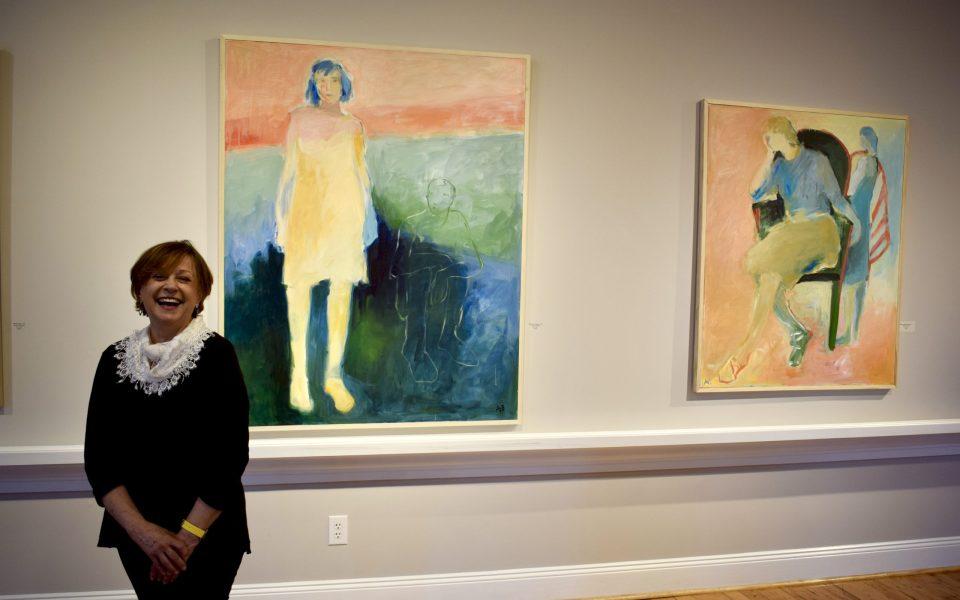They say if you want to know what mood you are in, you best start singing,” she says. “Whatever song comes out of you, it will tell you.”
This is one of Agnes Preston-Brame’s firmly held beliefs, and for her it holds true for the colors on her painter’s palette.
Born in Budapest, she defected from Soviet-controlled Hungary and immigrated to the United States, where she felt she could become the artist she wanted to be without the threat of state censorship. She earned her fine-arts degree from New York University in 1971 before moving to Greensboro in 1986. When she’s not traveling the world, she splits time between her interior design firm, Metamorphosis Design, and painting in her home studio. Her latest exhibit, figurEtively speaking, which is on view in the Central Gallery at Revolution Mill, features her most recent works.
“What I do is depict emotions, attitudes,” she says. “Often, I have done paintings without facial character that people recognize as their daughter or someone. So, it’s a character of the body, the human form that interests me.”
Preston-Brame draws from her days in New York City’s abstract-expressionist art scene of the ’60s and ’70s. Her acrylics are dispatches from days in the life that she interprets through the prism of her emotional experience, intuition and spontaneity. Because she creates from memory, she offers her subconscious to us and, save the often-ironic titles, meaning is ambiguous. Foggy-bordered human forms heighten the viewer’s sense that a glimpse into distant remembrance hangs before them.
“When you don’t do realistic work… then you have freedom,” she says. “It’s like writing a poem; it doesn’t necessarily sound like a sentence.”
Some pieces are more abstract than others: A pollen-yellow river surges forth from and becomes the whole of a woman’s bending figure — is this a spiritual transformation or a gown? All it takes is a bright streak of congealed red paint to confirm combative electricity between two people. Yet, “They, Too, Have Their Story” is a straightforward lunchbreak-on-a-city-park-bench scene that reveals masculine tenderness, perhaps a nod to an aspirational relationship between humankind and nature.[pullquote]Learn more at paintingsbyapb.com and visit the exhibition at 1150 Revolution Mill (GSO) throughJuly 1..[/pullquote]
Preston-Brame isn’t out to make a statement, though.
“Life is serious enough,” she says. “I don’t pretend to do any social comments or political comments or ecological comments, but I do want to depict the human spirit, thoughts, happiness, joke. It’s all coming from the inside. When I start working on a painting, I really don’t have a preconceived idea. I don’t know what I’m gonna do. As I put colors down, I maybe put an area that looks like a person, I develop it from there and it often depicts the mood I am in.”
In “Wish You Hadn’t Told Me,” all that is clear is that something was said. The seated woman comes off as less forlorn given the cheerful color theme, perhaps not a situation as morose as the title indicates. But maybe she is glum in spite of a figuratively sunny environment. We cannot know but for ourselves, and the same goes for “Where Are We Going?” as a girl protagonist stands her ground in the forefront while the outline of a male figure sits apathetically watching her make the moves, wondering, Will I be invited?
“She’s maybe lost but she looks determined,” Preston-Brame muses. “I’m an immigrant, I defected when I was a young person. So, I know that sense of loneliness, that What am I going to do? And the person next to me just as puzzled.”
Her paintbrush merely outlines the paper-selling pauper character in “Salesman.” Is he physically present, or a foggy memory? Whose? Is he a shell of a man in his own eyes, or simply invisible to others? Like the many subtle archways appearing throughout her work allude to her travels across Spain, the salesman is a specter of train stations in the Eastern Europe. Travel is a common motif in her work, best represented in a black-and-white series of vignettes of airport experiences: a missed flight; the huddled masses at baggage claim.
Every once in a while, though, she knows exactly where a scene or feeling derives. To that, she will only say, “It’s a long story. A long life.”
Join the First Amendment Society, a membership that goes directly to funding TCB‘s newsroom.
We believe that reporting can save the world.
The TCB First Amendment Society recognizes the vital role of a free, unfettered press with a bundling of local experiences designed to build community, and unique engagements with our newsroom that will help you understand, and shape, local journalism’s critical role in uplifting the people in our cities.
All revenue goes directly into the newsroom as reporters’ salaries and freelance commissions.


Leave a Reply